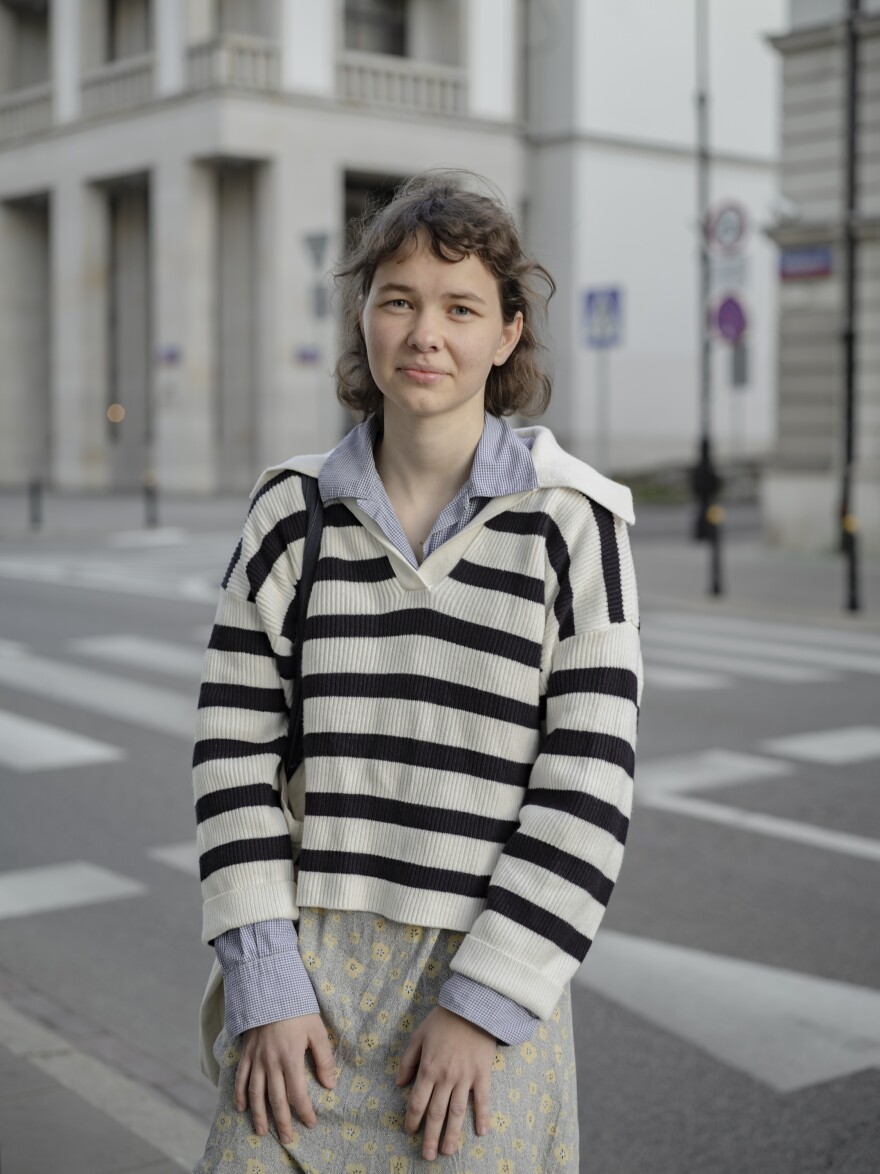As Ukrainians were racing to the Polish border to escape the Russian invasion, countless Poles rushed directly to meet them and help.
And these experiences of coming to offer aid, of inviting people into their homes and bearing witness to the suffering of their neighbors, are having a profound effect on this generation of young Polish adults.
Basia Olszewska, Lilia Nguyen, Tomek Mądry are all Poles in their twenties. The war has changed how they see themselves, their government, and their roles in Polish society.
In their own words, they tell NPR what that transformation has looked like.
Tomek Mądry, 24, student

I was twice at the border, and we just came for transportation, just with our own personal cars. I also spent a couple of days giving people coffee, providing them with tea, all that stuff. But the thing which changed me the most was that I came back with a refugee after that to my own house. I live in a two-bedroom flat and I was sharing the bedroom with him for almost a week. I don't have a separate bed, we slept in the same bed. It was really demanding to study at the same time, work at the same time, and have a refugee in my own house.
After the crisis happened, and the refugees started to come here, you start to only talk with people who are engaged in this stuff. I mean, it's hard to go to a party and talk about something else. So we have to reevaluate our normal life. I mean, I have a job, I have a status, all that stuff, all that mundane life that is going on. But the thing that kind of changed, I noticed that I don't talk so much with people who aren't so engaged.
I've seen the crying mothers, the puking children at the border. We adapt to the situation. It's hard to understand, but we are human, we adapt to the situation.
Lilia Nguyen, 25, student

My perception of everything changed when I went to the border. It was, like, maybe one week and a half after the war started. And I would say, those five days at the border were the most intense days in my life. After that, when I came back to Warsaw, I needed to reevaluate everything that I do in my life.
What I've noticed is that the friends that I have in Poland, for instance, they are conscious of what's happening, and they are more informed and they acknowledge everything that has been going on when it comes to the war. Because it is happening next door.
But it's also hard to predict how everything will go further in the future, because the war has been going on for more than two months, right? I am losing the sense of time already. And you can already see some people are getting a bit, I would say not annoyed, but less motivated to help.
Now when I'm in Warsaw, I don't really feel like I'm helping, even though I'm working with different organizations sending different things to Ukraine. It's still something different than being at the border, having this firsthand contact with those refugees. And I think it is quite, not beautiful, but I would say overwhelming, that you are able to help in these times of crisis. And I am actually astonished by how literally strangers work with strangers to help strangers, you know. And for me, it is quite moving, actually.
I think we all have some moments where we don't know how to react to some experiences. And at some point, we just get, like, paralyzed. But then in our head, we just need to get through this and our blood just becomes cold. And we're OK, we're good to go, we need to solve this. And it's how we learn, you know, with all the experiences that we have, that we're faced with.
Basia Olszewska 22, student and teacher

It was the first day of the war and I woke up, my flatmate woke me up, and he said that tanks crossed into Ukraine. I was just crying and I wasn't able to stop. And I didn't know what to do. And then, after a day or two, we took a group of three people from Congo, but they were studying in Kyiv. In the morning, there were eight people in my room. So this was the beginning. And then, me and my flatmate decided we wanted to help. And we're helping now in our organization, it is a club of Catholic Intelligentsia.
I should do the things that I can do, you know? Like, I didn't see myself rebuilding the Ukrainian country. I'm sorry, but it's not for me. I can organize camps for children, it is the thing that I usually do. But more broadly, I can't go back to the situation we had before.
Our generation now, we know exactly where the small cities are in Ukraine, and from where the refugees came. And it is a fantastic thing, because we're interested. We love the Ukraine people. I know how it sounds, but we really care.
Copyright 2023 NPR. To see more, visit https://www.npr.org.





